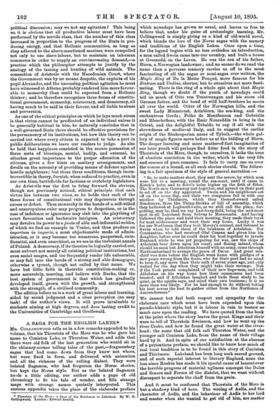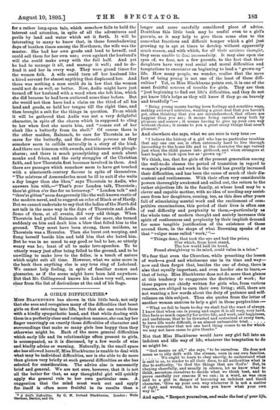A SAGA FOR THE ENGLISH LA - WES.* Mn. COLLINGWOOD tells as
in a few remarks appended to his volume, that his Thorstein of the Mere was he who gave his name to Coniston Lake, or Thurston Water, and adds that there were old folk of the last generation who would sit in the chimney-corner telling tales of the past,—fragmentary sagas that had come down from they knew not where, but were fixed in form, and delivered with animation and all the richness of the rolling dialect. They were belated Sagamen, who had forgotten the Norse stories, but kept the Norse style. But as the belated Sagaman neads a little editing, our author adds a page of old chronology to fit his tale of wonder, and fills strange maps with strange names quaintly interpreted. This curious appendix takes the place of the elaborate preface • Thoratein of the Mere: a Saga of the Northmen in Lakeland. By W. G. Collingwood. London: Edward Arnold.
which nowadays has grown so usual, and leaves us free to believe that, under his guise of archreologic learning, Mr. Collingwood is simply giving us a kind of old-world novel, which blends the lore of the Norse sagas with the scenery and traditions of the English Lakes. Once upon a time, for the legend begins with no leas orthodox an introduction, a man called Swein came into our country, and built a house at Greenodd, on the Leven. He was the son of his father, Biorn, a Norwegian landowner ; and no sooner do we read the name than a perverse memory carries us off to the most fascinating of all the sagas or semi-sagas ever written, the Magic Ring of De la Motto Fouqu6, more famous for his Sintrant and Undine, shorter, but to ourselves not more fasci- nating. There is the ring of a whole epic about that Magic Ring, though we doubt if the youth of nowadays could tell us much of Otto von Trautwangen and his stern old German father, and the band of wild half-brothers he meets all over the world. Ottur of the Norwegian hills, and the sweet Lady Minnetrost, Arinbiorn, the sea-king, and the enchantress Gerda ; Folko de Montfaucon and Gabrielle and Blanchefleur, with the Emir Noureddin to bring in the Orient, and the delightful Tebaldo to cap it all with the shrewdness of medival Italy, and to suggest the earlier origin of the Shakesperian name of Tybalt,—the whole gal- lery of magic figures move before us at the bidding of Biorn. The deeper learning and more matter-of-fact imagination of our later youth will perhaps find fitter food in the story of Thorstein of the Mere, though, to ourselves, it lacks the tone of absolute conviction in the writer, which is the very life and essence of pure romance. It fails to carry one on over the course at a bound, as all such stories should. The follow- ing is a fair specimen of the style of general narration :—
" So, to make matters short, they sent the arrow, by which men were bid to a meeting, round the sea-coast, until it came to Ketch's holm and to Solvi's holm higher up the firth of Eden. The North men thereaway met together, and agreed on their part to set off on the day appointed. Swein and his neighbours set off on the same day, and their two companies fell in with one another by Thirlmere, which they thenceforward called Brackmere, from the Thing-Brekka or hill of assembly, which they hallowed at Legburthwaite, as we still call the place, for- getting, may be, that we say Law-burg-field, being the mid-most spot in all Lakeland from Solway to Morecambe. And having hallowed the place and held their meeting, they made their tryst for next midsummer and went their way home. Lucky it was for our Northmen that they took Mercia's counsel, and listened to Swein when he told them of the briskness of Athelstan. For Constantine, who had received Olaf Cuaran and given him his daughter, before ever he could draw his host together to invade England, while he was yet preparing for war, saw the ships of Athelstan bear down upon his coast ; and fleeing inland, whom should he meet but Athelstan himself with an army, come through Northumberland to avenge the peace of Dacor. And great mis- chief was done before the English went home with pledges of a new peace wrung from the Scots, who for their part had no mind to keep it, any more than their oath of seven years ago, and only waited for the day when they might take their revenge. But if the York priests complained of their new liege-men, and told Athelstan on his way home how their summonses had been treated; and if Athelstan laughed and bade them study to be quiet, as the epistle says, and mind their own business ; it is no more than was likely. For he had enough to do without taking his host across the keel to gather either from the Northmen of Amounderness."
We cannot but feel both respect and sympathy for the elaborate care which must have been expended upon this pseudo-historic style, but it is labour in vain to bestow so much care upon the reading. We have quoted from the book at the point where the story leaves the great Kings and their wars to tell of Thorstein Sweinson, and how he went up the river Crake, and how he found the great water at the river- head; the same that old folk call Thurston Water, and the younger call Coniston Lake, from the name of their village
hard by it. And in spite of our satisfaction at the absence of a pretentious preface, we should like to know how much of real local tradition is to be found in this story of Coniston and Thirlmere. Lakeland has been long such sacred ground, and of such especial interest to literary England, none the less since Ruskin has made it his special cause of lament over the terrible progress of material ugliness amongst the Dales and Scaurs and Forces of the district, that we want without disrespect to separate the chaff from the grain.
And it must be confessed that Thorstein of the Mere is but a shadowy kind of hero. The wooing of Asdis, and the
character of Asdis, and the behaviour of Asdis to her lord and master when she wanted to get rid of him, are matter
for a rather long-spun tale, which somehow fails to hold the interest and attention, in spite of all the adventures and perils by land and water which set it forth. It will be interesting to many to know that, in those foreshadowing days of heathen times among the Northmen, the wife was the master. She had her own goods and land to herself, and could sell them for her own use ; even against the husband's will she could make away with the full half. And yet he had to manage it all, and manage it well ; and to de- fend it and her in every way. They were grand times for the women folk. A wife could turn off her husband like a hired servant for almost anything that displeased her. And there was nothing a man could do in law that the woman could not do as well, or better. Now, Asdis might have just turned off her husband with a word when she left him, which she did because he had been outlawed some time before. But she would not then have had a claim on the third of all his land and goods, so held her tongue till the right time, and then brought a suit for the things in question. From which it will be gathered that Asdis was not a very delightful character, in spite of the charm which is supposed to cling to her when first she meets him, and "comes out of her cloak like a butterfly from its shell." Of course there is the other maiden, Raineach, to care for Thorstein as he cares for the butterfly, and the dramatis persona as they somehow seem to collide naturally in a story of the kind. And there are kinsmen with swords, and kinsmen with plough- shares ; and there is much proselytising and much about monks and friars, and the early struggles of the Christian faith, and how Thorstein first becomes involved in them. And there are passages which somehow seem to have got touched with a nineteenth-century flavour in spite of themselves. "The mistress of Asmundarlea must be ill to suit if she waits a day longer than she likes," says Thorstein to Asdis, who answers him with,—" That's your London talk, Thorstein; thou'st gitten o'er fine for us hereaway." "London talk" and "thon'st gitten" seem dangerously like the well-known rustic of the modern novel, and to suggest an echo of Black or of Hardy. But we cannot undertake to say that the ladies of the North did not talk in the same way in the days of Thorstein and Asdis. Some of them, at all events, did very odd things. When Thorstein had pulled Raineach out of the mere, she turned suddenly on him and dealt him a blow that felled him to the ground. They must have been strong, these maidens, as Thorstein was a Hercules. Then she burst out weeping, and flung herself beside him and told him that she hated him. But he was in no mood to say good or bad to her, so utterly weary was be ; least of all to make love-speeches. To be utterly weary just after being felled to the ground, and to be unwilling to make love to the feller, is a touch of nature which might suit all time. However, what we miss more in the book than anything else is any true ring of Lakeland. We cannot help feeling, in spite of familiar names and glossaries, as if the scene might have been laid anywhere. But that Mr. Collingwood knows his Lakes very well, seems clear from the list of derivations at the end of his Saga.



































 Previous page
Previous page